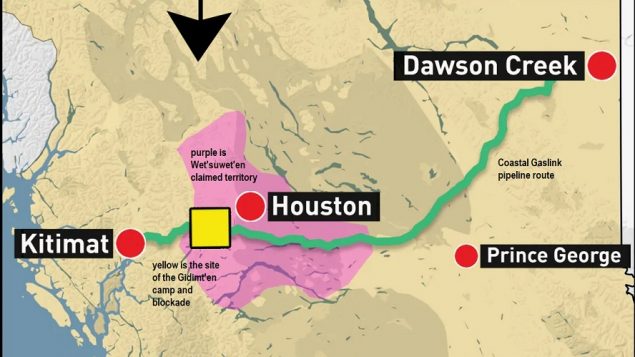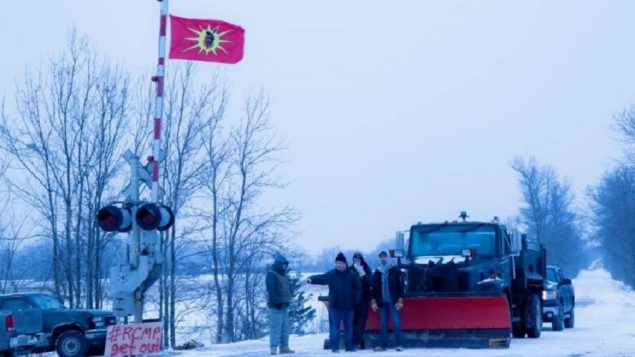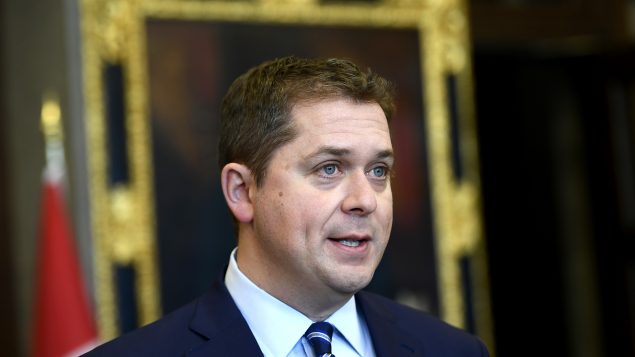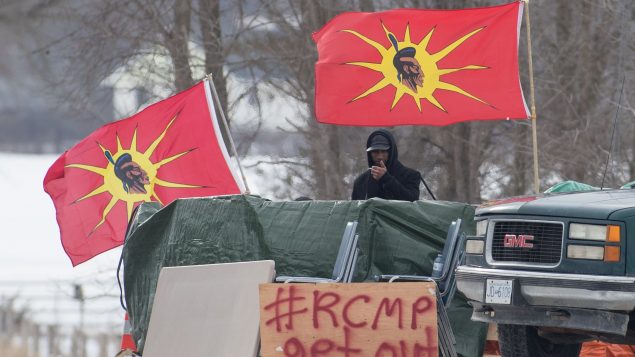Prime Minister Justin Trudeau convened a meeting of the cabinet’s Incident Response Group on Monday to address ongoing protests and rail blockades that have shut down much of the country’s rail traffic, disrupting passenger and freight service across Canada.
The incident group, which includes senior cabinet ministers, discussed how to handle the protests against a natural gas pipeline that crosses Wet’suwet’en territory in northern British Columbia.
The series of protests have not only crippled passenger and freight railway service in much of the country but also threaten to set back Trudeau’s efforts of reconciliation with Canada’s Indigenous peoples, the signature policy of his Liberal government.
“I understand how worrisome this is for so many Canadians and difficult for many people and families across the country,” Trudeau told reporters after the emergency meeting. He vowed to “focus on resolving the situation quickly and peacefully.”
Wet’suwet’en hereditary chiefs are opposed to the multibillion Coastal GasLink project, which has the support of the elected band council and other First Nations communities along its route.
The $6-billion, 670-kilometre Coastal GasLink pipeline would move natural gas from near Dawson Creek, in northeastern B.C., to a coastal LNG Canada export terminal in Kitimat. It is a key component of a $40-billion project announced by the federal and provincial governments last fall.

(CBC)
Wet’suwet’en hereditary chiefs say neither the federal nor provincial governments have any legal authority on their traditional territory, which has never been ceded to the Crown under any treaties or agreements with the government of Canada.
Over the last decade, they had set up a series of camps along the proposed route of the pipeline to prevent construction workers from accessing the area.
In January of 2020, in response to Coastal GasLink’s announcement that they plan to start work on the pipeline, Wet’suwet’en hereditary chiefs sent out a call for solidarity protests across the country.
The call sparked protests at railways, ferry terminals, major roads and government offices from coast to coast.

Members of the Tyendinaga Mohawk Territory moved a large truck toward a rail line in a protest Thursday supporting the Wet’suwet’en opponents of a natural gas pipeline in B.C. Although the rail line was never actually blocked, the railways cancelled service as a safety precaution (via CBC/Submitted by Oyohserase Maracle)
One of the potential flashpoints for a conflict is an Indigenous protest at a strategic chokepoint more than 4,500 kilometres east of Wet’suwet’en lands at Tyendinaga Mohawk Territory, about 240 kilometres west of Ottawa, in Ontario.
Mohawk protesters there have vowed to maintain their protests along the CN rail line that passes through their territory until Royal Canadian Mounted Police (RCMP) officers leave the traditional Wet’suwet’en territory.
According to CBC News, the Mohawks have set up two camps a couple of kilometres apart, along the CN tracks, but have put nothing across the tracks to block the passage of trains. The camps’ proximity to the rails, along with the Mohawks’ message to CN that they did not want any trains going through, was enough to shut down the tracks, CBC News reports.
These protests have forced Via Rail to temporarily cancel all passenger services nationwide, including service in the Toronto-Ottawa-Montreal corridor, the busiest in the country.
CN Rail, Canada’s largest railway company, announced last week that it “has been forced to initiate a disciplined and progressive shutdown of its operations in Eastern Canada.”
Ontario Premier Doug Ford spoke with Trudeau late Sunday and issued a statement urging the federal government to take action.
“Premier Ford asked the prime minister to take immediate action and provide detail on a clear plan to ensure an end to this national issue,” the statement read.

Conservative Leader Andrew Scheer speaks to reporters about rail blockades by activists protesting the Coastal GasLink project, on Parliament Hill in Ottawa, Friday, Feb. 14, 2020. (Justin Tang/THE CANADIAN PRESS)
Canada’s outgoing Conservative Leader Andrew Scheer has urged Trudeau to direct law enforcement agencies to enforce court injunctions against what he called “illegal blockades.”
Trudeau has rejected Scheer’s call to order police intervention, arguing that Canada “is not a kind of country where politicians get to tell the police what to do in operational matters.”
Indigenous Services Minister Marc Miller met with the Mohawk protesters in Tyendinaga near Belleville, Ontario, Sunday, asking them to temporarily halt their protests and allow trains through.
However, CBC News reported that a phone call from a Wet’suwet’en hereditary chief undercut that request.
After the meeting, Miller told reporters he achieved “modest progress” and some of the issues put on the table would be raised with the prime minister and federal cabinet.
With files from CBC News







For reasons beyond our control, and for an undetermined period of time, our comment section is now closed. However, our social networks remain open to your contributions.